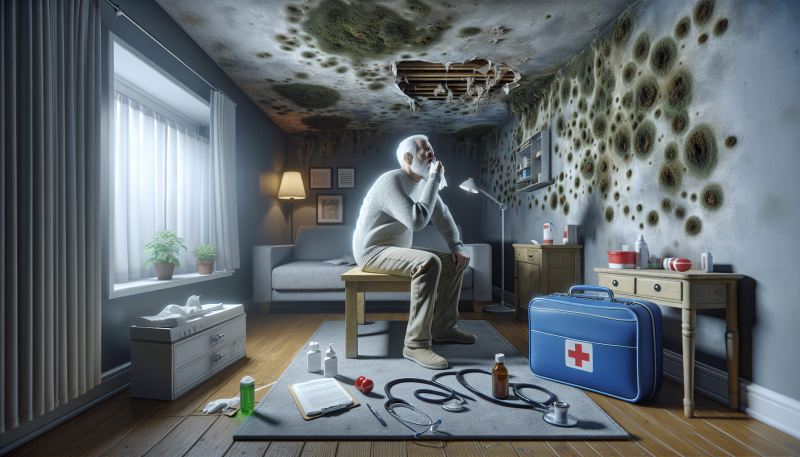The Health Risks of Ignoring Mold Damage
Mold damage is a serious issue that can have significant health implications if left unaddressed. At Kraus Restoration, NJ’s leaders in water damage, we understand the urgency and importance of tackling mold problems promptly. Ignoring mold damage can lead to a variety of health risks, including respiratory issues, allergic reactions, and even long-term illnesses. Our mission is to help those who’ve experienced property damage or loss due to water, flood, mold, fire, or smoke by quickly restoring their homes and lives back to normal. With our professional 24/7 emergency services, we ensure that your property is safe and habitable once again.
Our expertly trained crew manages mold damage and complete cleanup, ensuring thorough mold remediation. Mold spores can spread rapidly, contaminating the air and surfaces in your home, which is why immediate action is crucial. Homeowners and property managers in Central and Northern New Jersey can rely on our comprehensive range of services, including water cleanup, mold cleanup, and fire cleanup. We offer round-the-clock assistance, with a first response within one hour, ensuring that help is available whenever disaster strikes.
At Kraus Restoration, we pride ourselves on our IICRC certified experts who bring expertise and reliability to every restoration project. We handle everything from dealing with insurance companies to finding qualified contractors, making the restoration process as stress-free as possible for our clients. For more information or to schedule an inspection, visit our website or contact us directly. Trust Kraus Restoration to handle the tough work and restore your home to its pre-damaged condition.
Respiratory Issues and Allergies
Mold damage in homes and buildings is a serious issue that should never be ignored. One of the most significant health risks associated with mold damage is the development of respiratory issues and allergies. Mold spores can easily become airborne and, when inhaled, can cause a range of health problems, particularly affecting the respiratory system. Understanding the impact of mold on respiratory health and allergies is crucial for maintaining a safe and healthy living environment.
The Impact of Mold on Respiratory Health
Mold exposure can lead to a variety of respiratory issues, ranging from mild to severe. When mold spores are inhaled, they can cause irritation and inflammation in the respiratory tract. This can lead to symptoms such as coughing, wheezing, and shortness of breath. For individuals with pre-existing respiratory conditions, such as asthma or chronic obstructive pulmonary disease (COPD), mold exposure can exacerbate these conditions and lead to more severe health complications.
According to the Centers for Disease Control and Prevention (CDC), mold exposure can cause symptoms such as:
"Nasal stuffiness, throat irritation, coughing or wheezing, eye irritation, or, in some cases, skin irritation."
In more severe cases, mold exposure can lead to respiratory infections, particularly in individuals with weakened immune systems. The World Health Organization (WHO) has also highlighted the link between mold exposure and respiratory health, noting that:
"Indoor dampness and mold are associated with increased prevalence of respiratory symptoms, respiratory infections, and exacerbation of asthma."
Allergic Reactions to Mold
Mold is a common allergen that can trigger allergic reactions in sensitive individuals. When mold spores are inhaled, they can cause the immune system to overreact, leading to symptoms such as sneezing, runny or stuffy nose, itchy or watery eyes, and skin rashes. These allergic reactions can be particularly troublesome for individuals with mold allergies, as even low levels of mold exposure can trigger symptoms.
The American College of Allergy, Asthma, and Immunology (ACAAI) states that:
"Mold allergy symptoms are very similar to those of other allergies, such as sneezing, itching, runny nose, congestion, and dry, scaling skin."
In some cases, mold exposure can lead to more severe allergic reactions, such as allergic bronchopulmonary aspergillosis (ABPA), a condition that affects the lungs and can cause severe breathing difficulties. ABPA is most commonly seen in individuals with asthma or cystic fibrosis.
Long-Term Health Risks
Prolonged exposure to mold can have long-term health consequences, particularly for individuals with chronic respiratory conditions or weakened immune systems. Chronic exposure to mold can lead to the development of chronic respiratory conditions, such as asthma, or worsen existing conditions. Additionally, long-term exposure to mold can lead to a condition known as hypersensitivity pneumonitis, an inflammatory response in the lungs that can cause permanent lung damage if left untreated.
A study published in the journal Environmental Health Perspectives found that:
"Exposure to indoor dampness and mold is associated with a 30-50% increase in a variety of respiratory and asthma-related health outcomes."
Preventing Mold-Related Health Issues
Preventing mold-related health issues involves addressing mold problems promptly and effectively. This includes identifying and addressing sources of moisture, such as leaks or high humidity levels, and removing mold-contaminated materials. Professional mold remediation services, such as those offered by Kraus Restoration, can help ensure that mold is safely and effectively removed from your home or building.
Conclusion
Ignoring mold damage can have serious health consequences, particularly for the respiratory system. Mold exposure can lead to a range of respiratory issues and allergic reactions, and prolonged exposure can result in chronic health conditions. It is essential to address mold problems promptly to protect your health and the health of your loved ones. For more information on mold remediation services, visit Kraus Restoration or contact us today.
References
- Centers for Disease Control and Prevention (CDC). “Mold and Health.” Available at: https://www.cdc.gov/mold/dampness_facts.htm
- World Health Organization (WHO). “WHO Guidelines for Indoor Air Quality: Dampness and Mould.” Available at: https://www.who.int/publications/i/item/9789289041683
- American College of Allergy, Asthma, and Immunology (ACAAI). “Mold Allergy.” Available at: https://acaai.org/allergies/types/mold-allergy/
- Environmental Health Perspectives. “Dampness and Mold in Buildings as Risk Factors for Asthma and Respiratory Symptoms.” Available at: https://ehp.niehs.nih.gov/doi/10.1289/ehp.1002410
Long-term Health Consequences
When mold damage is ignored, the immediate effects are often visible and can be addressed with relative ease. However, the long-term health consequences of neglecting mold damage are far more insidious and can lead to chronic health issues that significantly impact quality of life. Understanding these long-term health risks is crucial for homeowners, property managers, and anyone responsible for maintaining indoor environments.
Respiratory Issues
One of the most common long-term health consequences of ignoring mold damage is the development of chronic respiratory issues. Mold spores are microscopic and can easily become airborne, making them easy to inhale. Over time, exposure to these spores can lead to chronic respiratory conditions such as asthma, bronchitis, and other lung diseases. Individuals with pre-existing respiratory conditions are particularly vulnerable, but even healthy individuals can develop problems after prolonged exposure.
Allergic Reactions
Mold is a known allergen, and continuous exposure can lead to persistent allergic reactions. Symptoms can range from mild, such as sneezing and a runny nose, to severe, including chronic sinusitis and skin rashes. Long-term exposure can also lead to the development of new allergies, even in individuals who have never had allergic reactions before. This can significantly affect daily life, making it difficult to engage in normal activities without experiencing discomfort.
Immune System Suppression
Prolonged exposure to mold can also have a detrimental effect on the immune system. The body’s constant battle against mold spores can weaken the immune system over time, making it more difficult to fight off other infections and illnesses. This is particularly concerning for individuals with compromised immune systems, such as the elderly, infants, and those with chronic illnesses. A weakened immune system can lead to more frequent and severe illnesses, further complicating health outcomes.
Neurological Effects
Recent studies have shown that long-term exposure to mold can have neurological effects. Symptoms such as headaches, memory loss, and difficulty concentrating have been reported in individuals exposed to mold over extended periods. These symptoms can be particularly debilitating, affecting work performance and overall quality of life. In severe cases, prolonged exposure to certain types of mold, such as Stachybotrys chartarum (black mold), has been linked to more serious neurological conditions.
Mental Health Implications
The impact of mold on mental health is an area of growing concern. Chronic exposure to mold can lead to symptoms of depression and anxiety. The stress of dealing with persistent health issues, combined with the physical effects of mold exposure, can create a vicious cycle that exacerbates mental health problems. Addressing mold damage promptly can help mitigate these risks and improve overall well-being.
Long-term Effects on Children
Children are particularly vulnerable to the long-term health consequences of mold exposure. Their developing bodies and immune systems are less capable of handling the stress caused by mold spores. Prolonged exposure can lead to developmental issues, respiratory problems, and a higher likelihood of developing allergies and asthma. Ensuring that living environments are free from mold is crucial for the healthy development of children.
Cardiovascular Issues
While less commonly discussed, there is evidence to suggest that long-term exposure to mold can have cardiovascular implications. Chronic inflammation caused by mold exposure can lead to conditions such as hypertension and other cardiovascular diseases. This is particularly concerning given the already high prevalence of cardiovascular issues in the general population.
Preventive Measures and Solutions
Given the severe long-term health consequences of ignoring mold damage, it is essential to take preventive measures and seek professional help when needed. Regular inspections and maintenance can help identify mold problems early, preventing them from becoming severe. Professional mold cleanup services, such as those offered by Kraus Restoration, can effectively address mold issues and prevent long-term health risks.
Additionally, understanding the importance of addressing water damage promptly can help prevent mold growth. Water cleanup services are crucial in mitigating the risk of mold development. For more information on water cleanup services, visit Kraus Restoration.
Conclusion
Ignoring mold damage can lead to a host of long-term health consequences that affect various aspects of well-being. From respiratory issues and allergic reactions to neurological effects and mental health implications, the risks are significant and far-reaching. Taking proactive steps to address mold damage can help protect your health and ensure a safe living environment. For more information on how to address mold damage and other restoration services, visit Kraus Restoration.
By understanding the long-term health risks associated with mold exposure, individuals can make informed decisions about maintaining their indoor environments and protecting their health.
In conclusion, the health risks associated with ignoring mold damage are both significant and far-reaching. Mold exposure can lead to a variety of health issues, ranging from mild allergic reactions to severe respiratory problems and chronic illnesses. The presence of mold in your living or working environment not only compromises the structural integrity of the building but also poses a serious threat to the well-being of its occupants. It is crucial to address mold damage promptly and effectively by seeking professional remediation services and implementing preventive measures to ensure a healthy and safe environment. By taking proactive steps to manage mold, you can protect your health and enhance the quality of life for yourself and those around you. Remember, when it comes to mold, vigilance and timely action are key to safeguarding your health.









